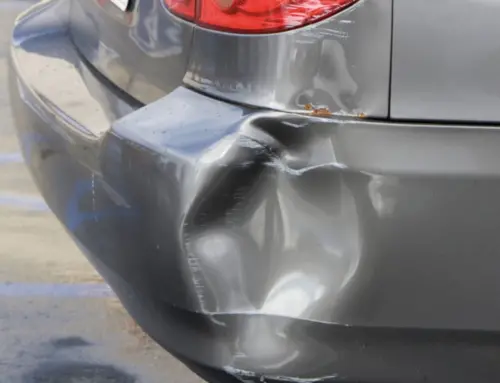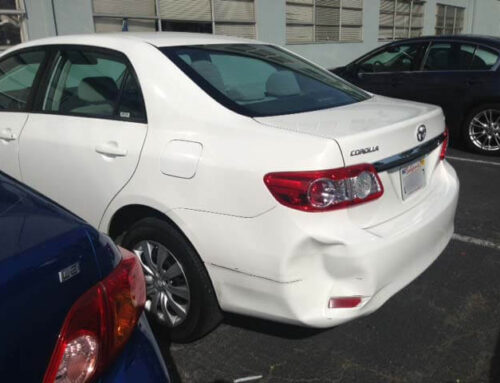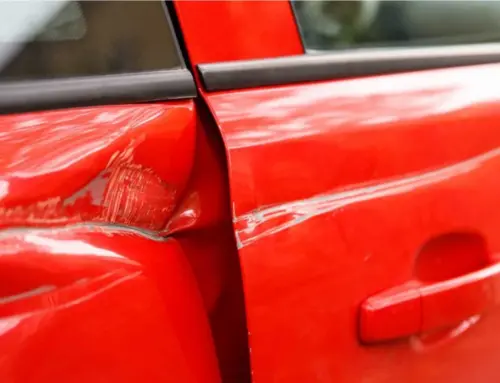A small dent might seem like a minor issue, but it can have a bigger impact on your car than you might expect. Those tiny imperfections not only affect the look of your vehicle, but they can also decrease its resale value and, over time, lead to more serious damage.
Getting small dents repaired quickly helps maintain your car’s appearance, keeps its value intact, and prevents further deterioration. Whether it’s a scratch from a grocery cart or a tiny bump in the parking lot, taking care of these dents early can save you a lot of trouble down the road.
How does repairing small dents help maintain a car’s value?
Repairing small dents plays a crucial role in maintaining a car’s value by preserving both its aesthetic appeal and structural integrity. Here’s how it helps:
- Preserves Exterior Condition: Even minor dents can make a vehicle look worn and poorly maintained. A clean, dent-free exterior signals that the car has been well-maintained, which is essential for attracting potential buyers or appraisers.
- Prevents Rust and Corrosion: Small dents can expose the metal underneath the paint, leaving it vulnerable to rust. Early repairs prevent this damage, helping to maintain the car’s condition and prevent costly repairs down the line.
- Improves Resale Value: Cars with minor imperfections are typically valued lower in the used car market. Keeping the body in good shape ensures that the vehicle retains a higher resale or trade-in value.
- Protects the Paint Job: Dents can compromise the paint job, leading to peeling or chipping over time. Fixing them early helps protect the vehicle’s finish, a key factor in preserving its overall value.
Addressing small dents quickly helps maintain both the appearance and longevity of a vehicle, ultimately supporting its market value.
What long term problems can small dents cause if left untreated?
If left untreated, small dents can lead to several long-term problems that can compromise the appearance, functionality, and overall value of your vehicle. Here are some potential issues:
- Rust and Corrosion: Small dents can break the paint’s protective layer, exposing the metal underneath to moisture and air. Over time, this exposure can lead to rust, which can spread and cause significant damage to the vehicle’s body.
- Paint Damage: Dents that aren’t repaired can cause paint to crack or chip. Once the paint is compromised, the exposed areas become more susceptible to environmental factors such as dirt, UV rays, and weather conditions, which can lead to further deterioration.
- Structural Integrity Issues: Although small dents may appear cosmetic, they can sometimes compromise the vehicle’s underlying structure. If left unchecked, the dent may impact the alignment of panels, doors, or even the frame, leading to more extensive and costly repairs.
- Decreased Resale Value: Dents that accumulate over time can negatively affect the vehicle’s resale or trade-in value. Buyers typically perceive untreated dents as a sign of poor maintenance, which reduces the car’s market appeal.
Ignoring small dents can lead to escalating repair costs, compromised safety, and a decrease in value over time.
Why do insurance companies pay attention to minor dent repairs?
Insurance companies pay attention to minor dent repairs for several important reasons, mainly tied to cost control, liability, and the overall condition of the vehicle. Here’s why they care:
- Preventing Larger, Costlier Issues: Small dents, if left untreated, can develop into more severe problems, such as rust, paint damage, or structural issues. Insurance companies recognize that addressing minor dents promptly can prevent more extensive and costly repairs later, thereby reducing the overall claim cost.
- Maintaining Vehicle Value: Insurance companies assess the condition of a vehicle when processing claims or determining premiums. A well-maintained vehicle, free of visible dents, is considered less risky, which can affect the cost and type of coverage. Keeping minor dents repaired helps maintain the car’s value, ensuring the vehicle is in better condition for future claims or appraisals.
- Fraud Prevention: Insurance companies closely monitor the timing and nature of repairs to ensure they are legitimate and not fraudulent. If dents aren’t repaired and then a large claim is made, it can raise suspicions of fraudulent activity. Keeping records of minor repairs ensures transparency and legitimacy.
- Risk Assessment: Dents that compromise the structural integrity or safety features of a car can increase the risk of accidents. Insurers want to ensure that all vehicle parts are in optimal condition, which includes fixing minor dents that could impact safety.
Insurance companies monitor minor dent repairs as a way to control costs, maintain accurate vehicle assessments, and minimize potential risks.
How can small dent repair affect overall vehicle safety?
Small dent repair can significantly impact overall vehicle safety by ensuring that the car’s structure and essential features remain intact and functional. Here’s how:
- Maintaining Structural Integrity: While minor dents may seem cosmetic, they can sometimes affect the structural components of the vehicle, such as the frame or body panels. If left unaddressed, these dents could compromise the car’s structural integrity, making it less safe in the event of an accident or collision. Timely repairs ensure that the vehicle maintains its strength and durability.
- Preserving Airbag Functionality: Dents, especially those near critical areas such as doors or the roof, can interfere with the proper deployment of airbags. If a dent affects the vehicle’s sensors or mechanisms, it could lead to malfunctioning airbags, reducing safety in the event of a crash.
- Ensuring Proper Alignment of Vehicle Components: Small dents, particularly in the doors or bumpers, can disrupt the alignment of essential parts, such as seals, hinges, or windows. This misalignment can make it difficult to close doors properly, potentially compromising vehicle safety in emergencies.
- Avoiding Paint Damage: Dents can cause damage to the vehicle’s paint, exposing the metal to the elements. This can lead to rust, which weakens the body and parts, such as doors, affecting the car’s performance and safety. Addressing small dents quickly prevents corrosion and helps maintain the vehicle’s integrity.
Small dent repairs are crucial for maintaining a vehicle’s structural integrity, ensuring the proper functioning of safety systems, and maintaining overall roadworthiness. Failing to address these repairs can potentially compromise the vehicle’s safety and reliability.
Protect Your Vehicle’s Value with Timely Dent Repairs!
At Piedmont Dent Repair, we understand how even small dents can impact your vehicle’s appearance and value. Timely dent repairs not only restore your car’s pristine look but also protect it from long-term damage, such as rust or paint deterioration. By addressing these minor imperfections quickly, you help maintain the integrity of your vehicle, ensuring it remains in top condition.
Whether it’s a door ding, a minor fender bender, or a small scratch, we specialize in fast, effective, and affordable repairs. Call today to protect your vehicle’s value and keep it looking like new!






